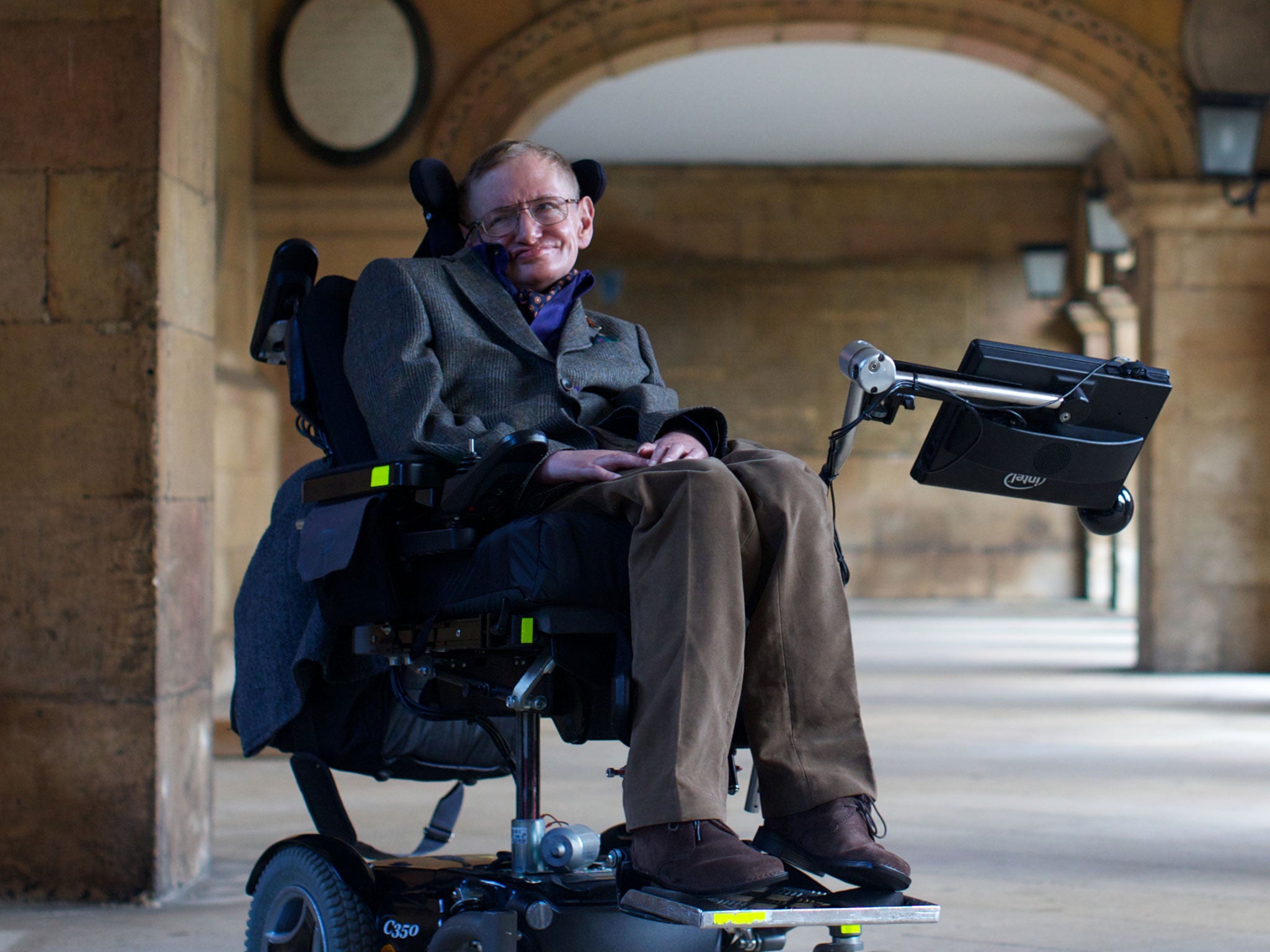Stephen Hawking: NHS is Britain's finest public service and must be preserved from commercial interests
World-famous physicist, diagnosed with motor neurone disease at 21, said he would not be alive today without the service

Your support helps us to tell the story
From reproductive rights to climate change to Big Tech, The Independent is on the ground when the story is developing. Whether it's investigating the financials of Elon Musk's pro-Trump PAC or producing our latest documentary, 'The A Word', which shines a light on the American women fighting for reproductive rights, we know how important it is to parse out the facts from the messaging.
At such a critical moment in US history, we need reporters on the ground. Your donation allows us to keep sending journalists to speak to both sides of the story.
The Independent is trusted by Americans across the entire political spectrum. And unlike many other quality news outlets, we choose not to lock Americans out of our reporting and analysis with paywalls. We believe quality journalism should be available to everyone, paid for by those who can afford it.
Your support makes all the difference.The NHS "must be preserved from commercial interests who want to privatise it", Professor Stephen Hawking has warned, in a heartfelt tribute to the health service, recorded to accompany a new documentary about his life.
Professor Hawking, who was diagnosed with motor neurone disease at the age of 21, said that he would not be alive today without the NHS, which he described as "Britain's finest public service".
Speaking for a Channel 4 short film to be broadcast on Wednesday, the world-famous physicist and author of A Brief History of Time, recalled his previous public statements about the health service, which came at the height of President Obama's healthcare reforms, when an American newspaper claimed that he would have died already if he were British had to rely on the NHS.
"I replied, 'I am British, and proud of it,'" Professor Hawking said. "Only last summer, I caught pneumonia, and would have died, but for the NHS hospital care. We must retain this critical public service, and prevent the establishment of a two-tier system, with the best medicine for the wealthy, and an inferior service for the rest."
A series of short films on Professor Hawking will be featured on Channel 4 this week, ahead of the screening of a feature-length film, Stephen Hawking: A Brief History of Mine, on Saturday.
The physicist leaped to the defence of the NHS in 2009, when the newspaper Investor's Business Daily wrote that he "wouldn't have a chance in the UK, where the National Health Service would say the life of this brilliant man, because of his physical handicaps, is essentially worthless."
His latest comments come at a time of growing concern over the incursion of commercial interests and competition into the health service, as David Cameron reaffirmed his commitment to the UK private health sector during a trade mission to China.
The Prime Minister announced deals on Monday that are potentially worth billions of pounds and will see British firms running Chinese hospitals and other care services.
Mr Cameron and his health secretary Jeremy Hunt have been accused by Labour of being too close to private healthcare companies.
The deals include a £120m contract for UK-based firm Sinophi Healthcare to build a 1,000-bed hospital in Jiangsu Province, and a deal which will see the Circle Partnership, which last year became the first private firm to run an NHS hospital, provide advice to one of China's biggest state-owned investment companies, the CITIC Group.
Both Mr Cameron and his health secretary Jeremy Hunt have special advisors who have served as head of communications for Circle. Christina Robinson - previously known as Christina Lineen - became Mr Hunt's special advisor in June, while Nick Seddon joined Mr Cameron's policy team in May. Mr Seddon, who was also deputy director of the right-wing think tank Reform, has previously advocated cutting thousands of NHS jobs and last month Reform said that the NHS could raise £3bn per year by charging for prescriptions, GP appointments and elements of hospital care - adding that funding pressures on the NHS made a debate about charging for NHS services "unavoidable".
The Coalition has cut health spending in real terms and the NHS is likely to face a funding gap of up to £30bn by 2020. Under the Coalition, rules have also been changed to allow NHS trusts to make nearly half of their income through paying patients, while new laws mean that NHS providers can be denied care contracts if they are deemed bad for competition in the healthcare market.
Mr Cameron said the Sinophi deal highlighted "the enormous opportunity that the Chinese healthcare market presents for British healthcare firms", while Mr Hunt said that the agreement would see "UK firms exporting their expertise to China - building their businesses and investing in Chinese healthcare."
"Both countries will benefit from these new relationships and better trade links," he added.
A Department of Health spokesperson said: “Like Stephen, we value the NHS highly but charities, social enterprises and independent providers play an important part in providing NHS care - and have done for many years.
“We believe the crucial thing is that all patients get the best possible services, free and available to everyone who needs them.
"All providers have to comply with exactly the same quality and safety standards as those in the NHS.”
Join our commenting forum
Join thought-provoking conversations, follow other Independent readers and see their replies
Comments